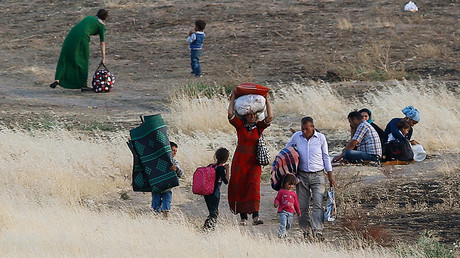
Russia’s proposal to include Kurds in Geneva Syrian talks was vetoed by the UN Security Council’s Western members, UN envoy Vitaly Churkin reported, saying this contradicts UN resolutions on Syrian reconciliation and ignores calls for inclusive talks.
Churkin warned that if the Syrian Kurds do not participate in the peace process, international efforts to bring peace to Syria could be undermined.
“We are concerned that the Syrian Kurds, historically woven into the social fabric of the country, still have not been invited to the Geneva talks,” he said, pointing out that by not inviting the Kurds, the West is violating the spirit of inclusiveness for the Syrian talks in the UN Security Council resolutions on Syria.
The diplomat also slammed the actions of the non-permanent member Ukraine, whose opposition to the Russian draft “added its destructive share” to the final decision.
The UN’s blocking of the participation of the Syrian Kurds in peace talks has been made “in order to please several regional players,” the Russian Foreign Ministry has said.
“This stance can’t but provoke deep regret, all the more because it is at odds with the decisions of the International Syria Support Group and the UN Security Council resolution 2254,” a statement from the ministry read.
“It is evident that this has been done to please some of the regional players, for which ambitions are more important than the real stabilization of the situation in Syria,” the statement added.
Russia will “insist on Kurdish participation in the next round of the Syrian talks,” and this participation is essential, the Russian side believes.
Kurds needed at talks to prevent Syria split
In March, de Mistura also advocated the participation of the Syrian Kurds in the Geneva talks in order to make them“as inclusive as possible,” warning that fragmentation of Syria into smaller breakaway states “would be unsustainable.”
“The Syrian Kurds are an important component of the country, so we need to find a formula in which they are able to express an opinion on the constitution and the governance of the country,” the UN envoy to Syria told Swiss Le Temps newspaper, while stressing that the unity of Syria must be preserved.
“I think no Syrian person, whoever he or she is, would accept that. They are very proud people of their own country,” he concluded.
Last month, some Kurds reportedly declared the federation of the region they control in northern Syria, calling it the “Federation of Northern Syria.”
“Syria’s Kurds have a long history of opposition and a long history of struggle for the legitimate rights of their people in this country,” Idris Nassan, an official in the foreign affairs directorate of Kobani, a city in the Aleppo province that has been controlled by the Kurdish militia since 2012, told RT in an interview.
Despite the Kurds’ desire for more independence from Damascus, Nassan asserted that separation is not what the majority of Kurds want and called on international actors to support a federalization.
The Syrian federal government denounced the move, however, calling it a direct threat to the integrity of the country that contradicts the Syrian constitution as well as international law.
“When one speaks of the federalization of our country, this directly threatens the integrity of our country, runs counter to the Constitution, contradicts the national concepts, even is at variance with the international resolutions and decisions, so all statements of the kind are illegitimate,” Syrian Ambassador to Russia, Riyad Haddad, said.
Syrian Kurds control an area stretching approximately 400 kilometers (250 miles) along the Syria-Turkey border and a section of the northwestern border in the Afrin area.
Damascus, opposition should do ‘homework’ ahead of Geneva – Lavrov
Earlier on Tuesday, Russian Foreign Minister Sergey Lavrov stressed that it was crucial that all parties, including the Kurds, are included in the upcoming round of Geneva talks. He made the statements after meeting with UN Special Envoy for Syria Staffan de Mistura in Moscow.
“Naturally, like in any conflict, the most important thing is to ensure the inclusive character of talks and their orientation towards direct dialogue between the parties,” Lavrov said.
He added that Moscow would “comprehensively” support such a format, expressing hope that all of the provisions included in the UN resolutions on Syria, as well as the resolutions of the Syria Support Group, would be implemented.
The minister stressed that both the Syrian government and opposition should do their respective “homework” in order to facilitate the talks’ success, while praising the work of the UN Special Envoy.
“You have summed up the results of the round of intra-Syrian talks and neither of the parties rejected these results,” he stated.
Lavrov also called for external mediators to send the participants clear synchronized signals “for peace and accord.”

In his turn, de Mistura urged the interested parties to step up their efforts to ensure that all sides of the Syrian conflict comply with the cessation of hostilities.
The Russian FM pointed out that a solution to the Syrian crisis should be entirely based on the principles outlined in the UN and Syrian Support Group resolutions which stipulate that “only the Syrian people can determine the future of their country.”
Meanwhile, referring to the inclusiveness of the talks, French Senate President Gerard Larcher stated that participants in the Geneva talks should consider the possibility of allowing the Kurds to take part.
“Negotiations should be inclusive…we should consider the possibility of the Kurds’ participation,” he told journalists on Tuesday. He also stressed that Syria should remain a single state, adding that France supports the renewal of the talks.
Lavrov expressed hope that De Mistura’s visit to the Russian capital ahead of the next round of Geneva talks would constitute “an important stage in preparations for the second round of the talks,” which is scheduled to begin in Geneva, Switzerland on April 11.



It is unclear how Hillary actually feels about the Syrians and the Kurds, but it couldn’t be more obvious that she loves the Lebanese.
https://www.youtube.com/watch?v=oXqPjx94YMg